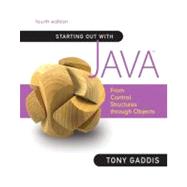Tony Gaddis’s accessible, step-by-step style helps beginning students understand the important details necessary to become skilled programmers at an introductory level. Gaddis motivates the study of both programming skills and a programming language by presenting all the details needed to understand the “how” and the “why”–but never losing sight of the fact that most beginners struggle with this material. His approach is both gradual and highly accessible, ensuring that students get the logic behind developing high-quality programs.
In Starting Out with Java: From Control Structures through Objects, Gaddis covers procedural programming–control structures and methods–before introducing object-oriented programming. As with all Gaddis texts, clear and easy-to-read code listings, concise and practical real-world examples, and an abundance of exercises appear in every chapter.
KEY BENEFIT : Gaddis introduces Java with an accessible, step-by-step style that helps beginners understand how to become skilled programmers.
KEY TOPICS : Introduction to Computers and Java; Java Fundamentals; Decision Structures; Loops and Files; Methods; A First Look at Classes; A First Look at GUI Applications; Arrays and the ArrayList Class; A Second Look at Classes and Objects; Text Processing and More About Wrapper Clauses; Inheritance; Exceptions and Advanced File I/O; Advanced GUI Applications; Applets and More; Recursion.
MARKET : Ideal for beginners to Java programming.








